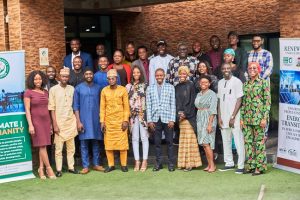With around 92 million Nigerians, or approximately 43% of the population, lacking access to power, a coalition of civil society organisations has called on the government to collaborate with private sector entities to alleviate the country’s energy poverty.

According to them, some of the most affordable and environmentally friendly ways to meet these energy needs are through renewable energy sources like wind, solar, and hydropower. They believe this will lessen the nation’s dependency on expensive and finite fossil resources.
There is no doubt that this worrisome situation needs to be harmonised, which, according to Pius Oko, the executive secretary of Lift Humanity Foundation (LHF), requires effective governance.
Oko, who made the statement on Thursday, October 5, 2023, during a workshop jointly hosted by his organisation (LHF) in collaboration with the Eco Steward and Humanitarian Foundation (EHF) under the auspices of the African Coalition for Sustainable Energy Access (ACSEA) in Abuja, pointed out that state structures such as policies, regulations, and institutions are significantly important for the country if it must integrate renewables into its energy mix.
The LHF chieftain explained that the event, which also witnessed the official launch of a report conducted to assess the position of renewable energy governance in Nigeria, was put together to discuss the numerous alternatives that the country can explore to successfully increase its deployment of renewable energy solutions to bridge its electricity demands, both for its rapidly expanding population and for the sustainability of its economic development.
Some key messages summarised in the policy brief showed that Nigeria’s government lacks the necessary infrastructure, financial resources, and experienced labour force to carry out renewable energy projects. It also revealed how the lack of strong legislation that supports grid-strengthening and large-scale renewable energy initiatives leads to conflicts among the various government agencies that are tasked with the responsibility of carrying out most of these programmes due to their competition for funding.
“These governance contexts,” he went on to explain, “can either support or hinder the development of renewable energy in Nigeria.”
As a result, the executive secretary advised that the government establish an effective inter-agency partnership, institutional collaboration, and information exchange to encourage the creation of knowledge networks on climate change concerns. Other recommendations he believes can assist the country in combating its unthinkable energy deficit include the development of a new financial model and mechanisms, the adoption of energy access champions in all key sectors, and the implementation of capacity-building and training programmes to build a skilled workforce in Nigeria’s renewable energy sector.
He urged policymakers and stakeholders to draw their swords and set aside their concerns about the various renewable energy choices.
“This will help ensure that the chosen energy source is the best fit across different sectors of the economy,” he said.
Michael Terunqwa, executive director of the Global Initiative for Food Security and Ecosystem Preservation (GIFSEP), believes that Nigeria has a wealth of natural, human, and financial resources to produce renewable energy to improve its energy balance.
“Anything you have in abundance, you take for granted,” he remarked, referring to Nigeria’s failure to incorporate renewable energy sources into its energy mix as quickly as it should.
The GIFSEP boss observed that Nigeria still considers power as a development concern rather than a business, which for him is the fundamental reason for the slow adoption of renewable energy.
He claims that deploying innovative technologies is one of the quickest methods to accelerate sustainable energy. And, if Nigeria does have these technologies, he replied no. But if it has the manpower and means to deploy them, he replied, sure.
So, why are Nigerians not employing numerous clean energy sources to address their electrical crisis? Terunqwa answered, “It is the lack of political will; we have to look at this thing as a business, and when we do, the issue of power will be a thing of the past.”
By Etta Michael Bisong, Abuja
